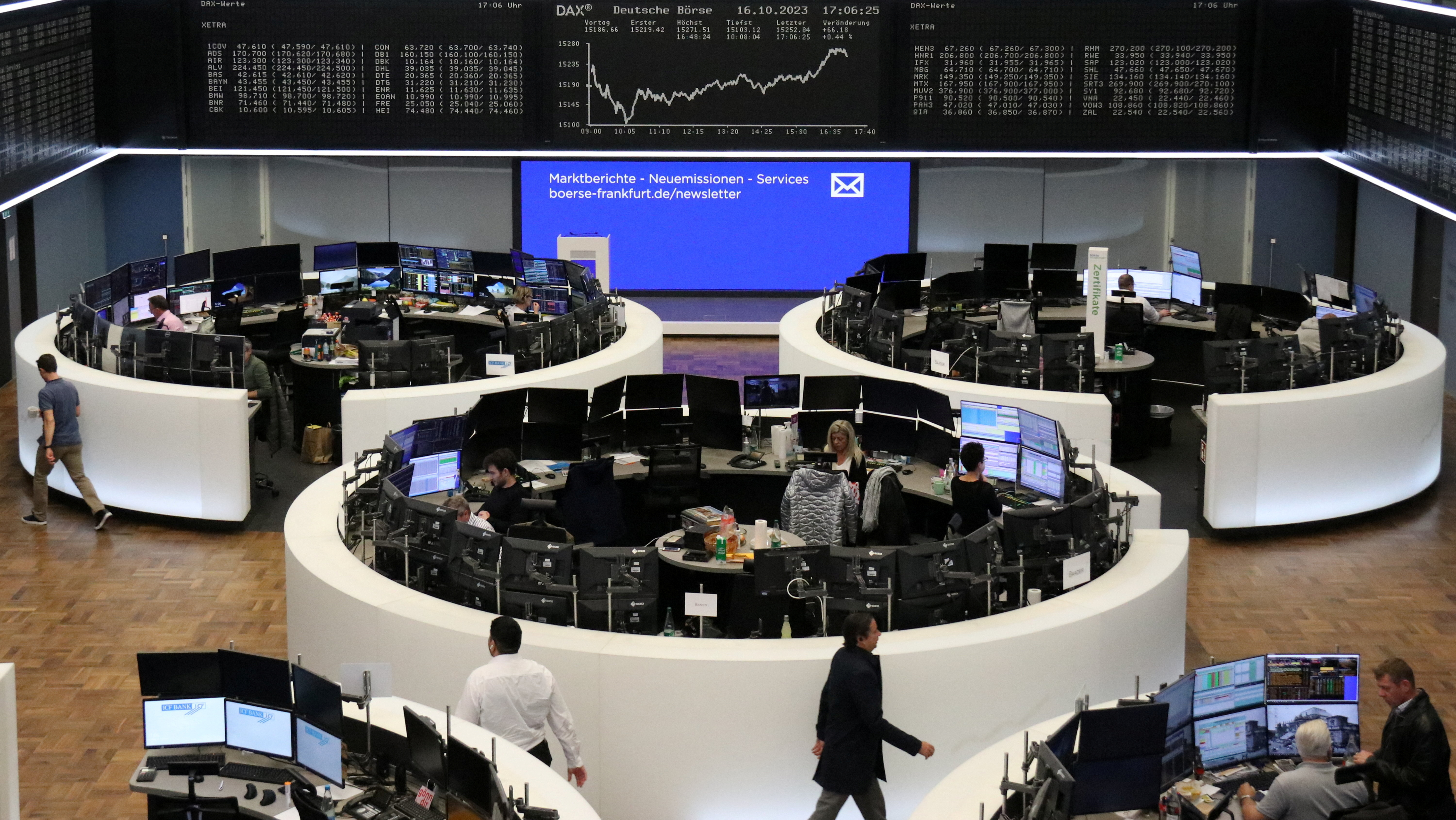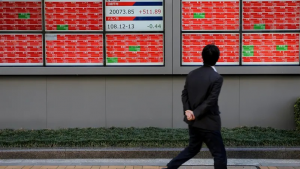Stocks tumbled on Thursday, under pressure from investor caution over the Middle East conflict and from the largest one-week rise in 10-year Treasury yields in 18 months, ahead of remarks by Federal Reserve Chair Jerome Powell and a heavy earnings day.
Investors are juggling two competing themes in the market right now - that of an outlook of sky-high interest rates for an extended period of time, and that of a war with the potential to upend global geopolitics.
The prospect of no rate cuts any time soon from the Fed has driven 10-year Treasury yields to almost 5%, the most in 16 years, while undermining stocks.
At the same time, investors have ditched bonds as a safe-haven choice and instead opted to buy gold, which is at its highest in two months.
Adding to the moving parts is the third-quarter earnings season. Thursday brings a raft of major company results, including TSMC , the world's most advanced chip maker, as well as Philip Morris (PM.N), Blackstone (BX.N) and Fifth Third Bancorp .
The MSCI All-World index of global shares (.MIWD00000PUS) was down 0.35% on the day, reflecting a 0.7% drop in Europe's STOXX 600 (.STOXX) and overnight weakness in Asian markets.
Prices for U.S. Treasuries, meanwhile, fell for a fourth day, pushing the yield on the benchmark 10-year note up another 7 basis points to 4.968%, putting it on track for a weekly rise of 34 bps, the biggest one-week increase since April 2022.
Typically, when investors seek out safe-haven investments, bonds are a top choice, but with interest rates rising and a raft of debt supply due to hit the market in the coming weeks, other forces are at work right now, Frederik Ducrozet, head of macroeconomic research at Pictet Wealth Management, said
"We'll see how this geopolitical situation evolves. The risk premium is clearly playing more out in gold, for instance, and in the U.S. dollar, than in bond yields - that is not the main driver of the day. It's very much supply and demand and 'higher for longer'," he said.
"This tells you a lot about how different the situation is today, when even the risk of regional, if not global, conflict does not help U.S. Treasuries," he said.
U.S. stock index futures , fell around 0.2%. Shares in Tesla (TSLA.O) fell 5.7% in pre-market trading after the world's most valuable car company reported a drop in gross margins in the third quarter. Shares in Netflix (NFLX.O), meanwhile, rose 13% thanks to a boom in subscriber numbers in several key markets in the three months to September.
The main event for markets however, will be Powell's speech on the economic outlook before the Economic Club of New York later on.
A Reuters poll of economists showed the Fed will keep interest rates unchanged when it meets on Nov. 1, and a growing number see no cut in rates until the second half of 2024.
"He (Powell) will hedge his bets in this environment," said Shane Oliver, head of investment strategy and chief economist at AMP in Sydney, noting the head of the central bank will likely reinforce the higher for longer view.
The dollar index , which measures the U.S. currency against six others, was flat on the day, while the Japanese yen , another traditional safe haven, was mired near one-year lows at 149.82 per dollar.
Gold was up 0.14% at $1,950.50 an ounce, near two-month highs. Nervousness about the situation in the Middle East has pushed gold up by 8% in the two weeks since Palestinian militant group Hamas' rampage in Israel.
U.S. President Joe Biden pledged to help Israel and the Palestinians during a lightning visit on Wednesday.
The region remained volatile in the aftermath of an explosion at Gaza's Al-Ahli al-Arabi hospital late on Tuesday, which Palestinian officials said killed 471 people and blamed on what they said was an Israeli air strike. Israel and the U.S. said the cause was a failed rocket launch by Islamist militants in Gaza, who denied responsibility.
Oil fell on Thursday after the Organization of the Petroleum Exporting Countries showed no signs of supporting the call of fellow member Iran for an oil embargo on Israel, and as the United States plans to ease sanctions on Venezuela to allow more crude to flow globally.
Crude futures have had a fraught couple of weeks, rising to as much as $93 a barrel from as little as $83.
So far, October has been oil's most volatile month of trading since November 2021, based on an index of oil volatility (.OVX).
Brent crude futures , which underpin most of the world's oil trades, were last down 1.4% at $90.19 a barrel, having risen 2% the day before. U.S. crude futures were down 1.2% at $87.26.











